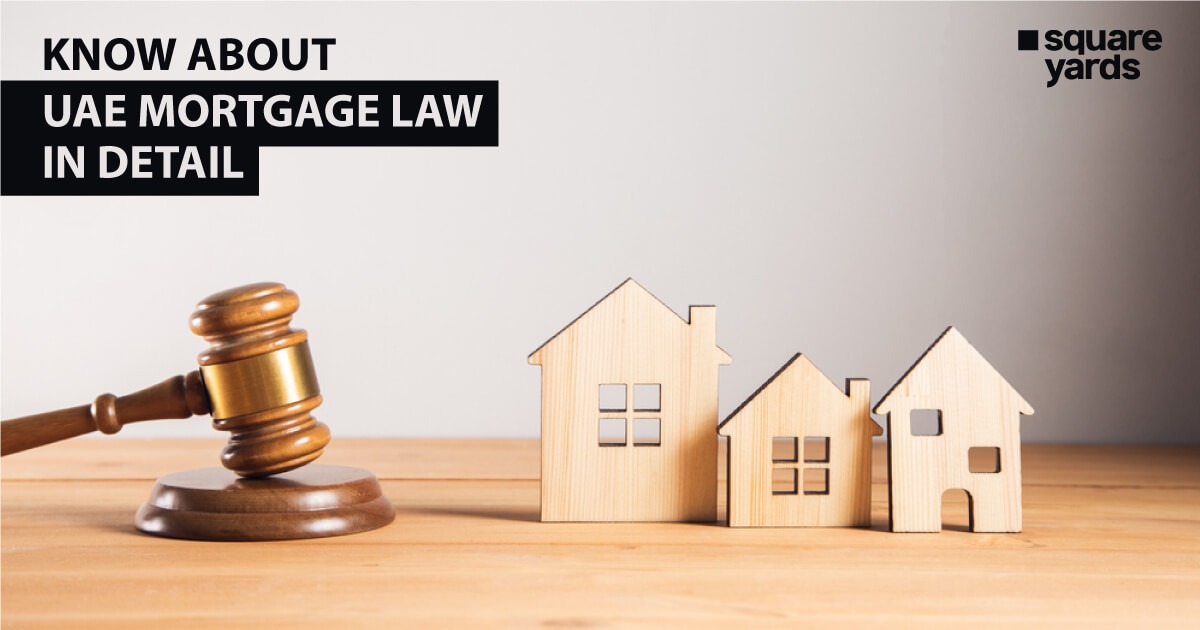Are you finally ready to transition from being a tenant to becoming a property owner in one of the prestigious emirates of the UAE? Although it can look appealing from the outside, but in reality, purchasing a home in the UAE can be quite difficult and requires careful consideration and decision-making. However, once you’ve decided, the next step is to line up your finances accordingly. For beginners, this financial aspect can be overwhelming, leading some to venture into the world of mortgages without a clear understanding of the process. So, before you dive into the excitement of searching for properties for sale in the United Arab Emirates, it is crucial to familiarise yourself with the basic concepts of UAE mortgage law. From documents required to get a mortgage to the best mortgage rates in UAE 2023, this guide has got everything covered.
UAE Mortgage Law – A Brief Overview
In late October 2013, the Central Bank of the United Arab Emirates issued a fresh set of regulations concerning mortgage lending to banks and other financial institutions. These laws were designed to ensure strict compliance with established frameworks for mortgage loans. Over time, these policies have undergone periodic updates and enhancements to align with evolving financial dynamics.
-
Execution Proceedings on the Mortgaged Property
This section provides clear instructions on what a mortgagee (the lender) can do if the person who borrowed the money (the mortgagor) fails to make their payments on time. According to the law, the mortgagee has the right to start legal actions against the mortgagor. The process involves selling the property through a public auction, but before that, certain steps and notice periods must be followed and completed.
What is Covered in the UAE Mortgage Law?

In 2009, Law No. 9 was introduced to modify certain provisions of Law No. 13 of 2008, which governs the interim real estate register in Dubai, commonly known as the ‘Mortgage Law.’ This law is important for regulating mortgages in the emirate and has key principles outlined as follows:
Definitions: Articles 3-6 of the law provide clear explanations of important terms used in the mortgage process, such as ‘Mortgage,’ ‘Mortgagee,’ and ‘Mortgagor.’
-
Registration for Mortgage
According to Article 7, a mortgage is only considered valid if it is registered with the Department, and any agreement stating otherwise will not be recognized. The person who owns the property, known as the ‘Mortgagor,’ is responsible for covering the expenses of the contract, unless there is a different agreement. The registration fee for a mortgage is 0.25% of the loan amount plus AED 4,100.
-
Mortgage Application for RERA
This part of the law lists down all the necessary details and documents that must accompany a mortgage application for it to be successfully registered.
-
Legalities of the Mortgage
Articles 10-20 cover the rights and limitations of both the mortgagor and the mortgagee during the period of the mortgage. These provisions ensure that both parties are aware of their responsibilities and entitlements.
-
Default in Payments
These articles provide detailed guidelines on how a mortgagee can take action against a mortgage if the borrower fails to make the required payments. After following all the necessary penalty procedures and giving appropriate notice periods, the law mandates a public property auction to be conducted.
Loan-to-Value Ratios Explained

The Central Bank of the UAE released a new set of guidelines for mortgage lending to banks and other financial institutions in October 2013. The major goal of these laws was to make sure that these institutions offer mortgage loans in accordance with best practises and with appropriate control methods. The Loan-to-Value (LTV) ratios required under the mortgage regulations are shown in the table below.
NOTE: It’s crucial to remember that the sole current exemption to these LTVs pertains to loans given to citizens of the UAE through government housing programmes.
|
UAE Nationals |
Non UAE Nationals |
|
|
First Property |
Property valued at AED 5 million or less. LTV = 80% |
Property valued at AED 5 million or less. LTV = 80% |
|
Property valued at more than AED 5 million. LTV = 70% |
Property valued at more than AED 5 million. LTV = 65% |
|
|
Subsequent Property |
LTV = 65% (Irrespective of the property value) |
LTV = 60% (Irrespective of the property value) |
|
Off Plan |
LTV = 50% (Irrespective of the property value) |
LTV = 50% (Irrespective of the property value) |
Important : According to the laws of the Central Bank, it is required that you allocate no more than 50% of your total income towards settling your debts, which includes mortgage payments, credit card dues, and other loans. It is strongly advised that you carefully evaluate your financial condition before opting to apply for a mortgage in order to establish a solid financial foundation. This will enable you to assess your comfort level with managing your debt commitments within the established parameters.
Different Kinds of Interest Rates on Mortgages
The types of interest rates on mortgages are as follows:
-
Fixed Mortgage Rates
Fixed mortgage rates are simple, consistent interest rates that are applied to the amount of your mortgage. The rate is set before you sign the mortgage offer letter and remains the same for a certain number of years. In rare circumstances, the lender could insist on a fixed rate for the length of the loan. The advantages of selecting a stable interest rate are as follows:
-
- Home buyers who choose a fixed interest rate may budget with confidence since there won’t be any further changes in mortgage rates during the loan term.
- In the case of rising mortgage rates, dealing with a fixed interest rate offers security from future financial disasters.
- With a fixed interest rate, the mortgage buyer pays a set and predictable amount each month, making it easier for them to keep up with their other financial obligations.
-
Variable Mortgage Rates
Mortgages with variable interest rates, commonly referred to as adjustable-rate mortgages, have interest rates that are subject to market fluctuations and may change throughout the duration of the loan. Such a mortgage interest rate may be beneficial if:
-
- It is possible that over time, interest rates will either stabilise or fall.
- You have the stability and flexibility in your finances to handle future fluctuations in mortgage rates.
Essential Documents for Obtaining a Mortgage in UAE

According to UAE mortgage rules, you must provide specific documentation to prove your identification and financial condition in order to apply for a mortgage in the country. The following are the necessary documents:
- A financial document that serves as evidence of your present financial status. This document should include details about your salary, tax returns, and any additional sources of income.
- Proof of residence in the UAE, which should include an accurate address and information confirming your current whereabouts.
- A copy of your passport for identification purposes.
These papers are required for the UAE mortgage application procedure. To guarantee a quick and easy approval process, be sure to have these prepared when you apply for your mortgage.
Step-By-Step Guide to Getting a Mortgage Loan in the UAE
By following this simple step-by-step guide, you can successfully secure a mortgage loan in the UAE.
Step 1 : First, make a decision whether you want to go directly to a bank or seek the assistance of a financial agent or broker.
Step 2 : Next, determine which type of mortgage rate suits you best – whether it’s a fixed interest rate or a variable one.
Step 3 : Obtain an Agreement of Principle from the mortgagor, which confirms that you are eligible for the loan.
Step 4 : Find the home of your dreams and submit an offer to the seller.
Step 5 : Both parties will negotiate and come to a decision. Once an agreement has been made, send your deposit to seal the contract and request from the bank a date of completion.
Step 6 : The lender will release the funds to you on the completion date.
Following these steps will lead you to achieve your goal of obtaining a mortgage loan in the UAE without any hassle.
Understanding the Mortgage Cap in the UAE
In response to an increase in real estate prices brought on by speculators, the UAE Mortgage Cap was first announced in December 2012. This law was intended to control mortgage lending nationwide. You should be aware of the following important details about the mortgage cap in UAE:
-
- Cap for Expats: The Mortgage Cap restricts mortgages for expats to 75% of the property value for their initial purchase and 80% for UAE residents. In other words, UAE citizens are required to put down a minimum of 20%, whereas expatriates are obliged to put down a minimum of 25% of the property’s worth.
- Additional Cap for Large Loans: Loans over AED 5 million are subject to additional limitations under the Mortgage Cap. Mortgages on such houses are limited to 65% of the valuation, for expats.
- Purchasing a Villa in Dubai: If you’re thinking of buying a villa in Dubai with a property worth between AED 5 and 10 million, be ready to put down close to 50% of the purchase price in cash.
Understanding the UAE Mortgage Cap is essential when planning to buy property in the country. It’s important to take these regulations into account and ensure you have the necessary funds available before proceeding with a property purchase.
Mortgage Costs in the UAE

If you are planning to buy a real estate property in Dubai or any other emirate, it’s important to be aware of the mortgage costs in addition to the property’s price. Yes, you read that right! These costs are unavoidable and are a mandatory part of UAE mortgage regulations. When you apply for a mortgage in the UAE, you will be required to pay 0.25% of the total property investment to register the loan. In addition to this, the lender may charge you for a mortgage protection insurance and valuation fee. These costs are essential components of the mortgage process in the United Arab Emirates, so it’s important to factor them into your budget when planning to purchase a property. So, we suggest you be prepared for these expenses as you move forward with your mortgage application.
Best Mortgage Rates in UAE & Dubai for April 2023
Discover the best mortgage rates in Dubai & UAE for April 2023 by referring to the tabular representation below:
|
BANK / MORTGAGE LENDER |
INTEREST RATE |
MINIMUM SALARY REQUIREMENT |
MAXIMUM LOAN AMOUNT |
ISLAMIC |
|
FAB Mortgage Loan |
2.49% (Reducing Rate Fixed for 1 year) |
15,000 AED |
AED 20,000,000 |
NO |
|
Standard Chartered Bank Mortgage Loan |
1.49% + 3M EIBOR (reducing rate) |
10,000 AED |
AED 18,000,000 |
NO |
|
RAKBANK Home in One Mortgage Loan |
1.99% + 3M EIBOR (reducing rate) |
15,000 AED |
AED 20,000,000 |
NO |
|
CBD Mortgage Loan for Expats |
3.99% (reducing rate) |
12,000 AED |
AED 10,000,000 |
NO |
|
United Arab Bank Home Finance |
3.69% (reducing rate) |
15,000 AED |
AED 10,000,000 |
NO |
|
HSBC Mortgage for Self Employed |
3.31% (reducing rate) |
20,000 AED |
AED 10,000,000 |
NO |
|
SCB Home Finance for Self Employed |
3.97% (reducing rate) |
50,000 AED |
AED 10,000,000 |
NO |
|
ISLAMIC HOME FINANCE PROVIDERS |
Profit Rate |
MINIMUM SALARY REQUIREMENT |
MAXIMUM FINANCE AMOUNT |
ISLAMIC |
|
ADIB Home Finance |
3.25% (reducing rate) |
10,000 AED |
AED 15,000,000 |
YES |
|
DIB Home Finance |
3.24% (reducing rate) |
12,000 AED |
AED 50,000,000 |
YES |
|
Emirates Islamic Manzili Home Finance |
3.49% (reducing rate) |
15,000 AED |
AED 20,000,000 |
YES |
Conclusion
The UAE real estate market has experienced rapid expansion, drawing both investors and buyers who use mortgage programmes to obtain their dream homes. However, before making a decision, you must be well-informed. To make sure you choose the best course of action for your requirements, take some time to go through this comprehensive guide on UAE mortgage law and don’t forget to consider the banks that offer the best mortgage rates in the UAE for April 2023.
More Useful Articles for You :
|
Applying Mortgage in Dubai |
|
|
Know About Dubai Rental Market |
|
|
Understand Tenancy Contract Sharjah |
|
|
Guide To Labour Law in UAE |
Frequently Asked Questions (FAQs)
Law 14 of 2008 in Dubai governs mortgages, outlining regulations for mortgage transactions, registration, rights, and enforcement. It provides clarity and protection for both borrowers and lenders in the real estate market.
In the UAE, the maximum mortgage period allowed is twenty-five years. However, there are age restrictions for borrowers: salaried individuals must not exceed the age of 65 years by the end of the mortgage term, while self-employed individuals must be under 70 years old.
Yes, mortgages are legal in Dubai. The UAE, including Dubai, has a well-established and regulated mortgage market. The Dubai government has implemented laws and regulations to facilitate mortgage transactions and protect the rights of both borrowers and lenders.
Yes, it is possible to leave the UAE with an outstanding mortgage. If you plan to relocate or leave the country permanently, you will need to inform your bank about your decision. The bank will likely make adjustments to the terms and interest rate of your mortgage and convert it into a non-resident mortgage. However, in some cases, the bank may require you to settle the mortgage in full before you leave the UAE.
In the UAE, the amount of mortgage you can get depends on the loan-to-value ratio (LTV) set by the lender. The LTV is a measure of how much money you can borrow in relation to the property's value that you intend to purchase. For instance, if a property is valued at AED 2,000,000 and the maximum LTV allowed is 80%, you can borrow up to AED 1,600,000. This means you would need to provide the remaining 20% (AED 400,000) as a down payment or from your own funds.
The banks that offer the best mortgage rates in UAE involve FAB Mortgage Loan, Emirates Islamic Manzili Home Finance, CBD Mortgage Loan for Expats etc.
The current mortgage rates in UAE vary depending on different banks and financial institutions. Each bank may offer different interest rates and terms for their mortgage products. It is recommended to check with individual banks or lenders directly to get the most up-to-date and accurate information
Standard Chartered Bank's Mortgage Loan offers the lowest mortgage rate.
Under the Mortgage One scheme, the bank has established the reducing rate at around 3.49%, while the fixed rate is set at 2%. The fixed-rate may vary over the 25-year maximum term. What is the Law 14 of 2008 on mortgages in the Emirate of Dubai?
What is the mortgage period in the UAE?
Are mortgages legal in Dubai?
Can I leave UAE with a mortgage?
How much mortgage can I get in the UAE?
Which bank has the best mortgage rates in the UAE?
What are the current mortgage rates in UAE?
Which bank has the lowest mortgage rate?
What is the interest rate for mortgage in Dubai 2023?




